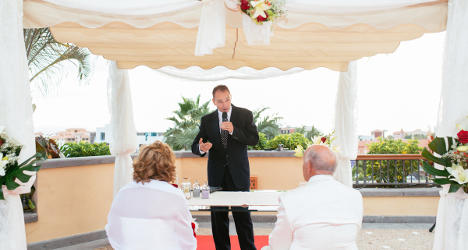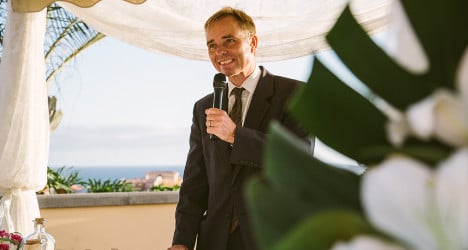What brought you to Tenerife?
I was born in Venezuela then moved to Austria where I lived for seven years. My wife and I decided we wanted a change and, since we had family ties to the Canary Islands, we thought we would move to Tenerife.
Did you experience any culture shock when you moved to Tenerife?
I didn't experience any culture shock in terms of the people; the Canaries have lots of links to Venezuela and people actually call Venezuela the eighth Canary Island, so it was easy to settle in in that sense. I did find that the pace of life is much slower in the Canaries and things are a little bit less well organized. I also need to use a car here whereas in Austria I could use public transport.
What do you like about living in Tenerife?
The people and the weather: it is a luxury to be able to go to the beach in the middle of winter!
And any dislikes?
I don’t like the corruption cases in politics that are so common these days. But I would say, in general you adapt to living here, to the slower pace of life.
How did you get into the wedding business?
Completely by chance! I was working as a business consultant and a German woman who wanted to start a wedding planning business approached me. At first I collaborated with her as a business consultant and then one day she asked me to be the wedding celebrant at a wedding. I said yes because I always like a challenge.
Had you ever worked in weddings before?
No, it was something completely new.

Andreas Fischer pictured during a renewal of vows ceremony in Tenerife. Photo courtesy of Andreas Fischer.
How do you prepare for the weddings?
We always send couples a questionnaire that includes all sorts of questions about the couple: how did they meet? Who proposed? What are your dreams as a couple? Then I meet with the couple to discuss their wishes for their big day and give them advice on the ceremony: what music they should choose, for example.
How many ceremonies have you performed?
Since August 2011 I have done 80 ceremonies, which works out at about two and a half a month.
What kind of people get married in Tenerife?
Seventy percent of the couples I marry are foreigners. (German/Austrian/Swiss) and 30 percent are Spanish. In the last two years there has been an increase in the number of Spanish couples. If we’re talking about weddings in general in Tenerife, then most of them are English speaking couples, from the UK and Ireland. They often come in big groups.
Why do you think the Canaries are such a popular place to get married?
The Canary Islands are one of the top tourist destinations in the world. People come here for the landscape, the weather, the people and the beach – lots of weddings take place on the beach.
What are the main differences between your weddings and more traditional weddings?
My weddings are much more personalized; the whole history of the couple’s relationship is woven into the ceremony. We also have a tradition called the ‘sand ceremony’ which is when the bride and groom fill a bottle with different coloured sand, representing them coming together, it is a beautiful memento for them to take away from their special day.
Another difference is that I have the couple stand in front of the guests at some moments in the ceremony whereas in a church they stand with their backs to the guests. This lets the couple’s family and friends really share in the experience and see the reactions of the bride and groom.
What is the most unusual wedding you have ever officiated?
I once officiated the wedding of a pair of Harley Davidson enthusiasts who got married in their leathers. One couple also got married on a catamaran and after the ceremony, scattered rose petals into the sea. There haven't been any Star Wars weddings yet, but maybe one day!
Have you seen a decrease in the number of weddings taking place since the economic crisis hit Spain?
Spaniards are continuing to get married. Spanish families make a big investment for their children’s’ weddings and generally, Spanish weddings are big affairs – lots of guests, whereas German weddings, for example, are much smaller, sometimes with only the couple.
What advice do you have for someone wanting to become a wedding celebrant?
Firstly, you have to be well-prepared. You have to prepare the ceremony well and get to know the couple. You also have to have the necessary skills, one of the most important being language proficiency.
You can find out more about Andreas Fischer on his website: http://www.oficiantenerife.com/


 Please whitelist us to continue reading.
Please whitelist us to continue reading.